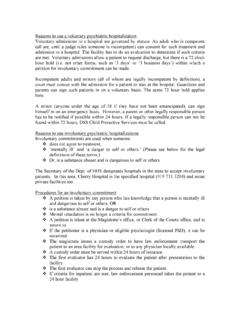Transcription of Ten Reasons for Not Legalizing Prostitution And a Legal ...
1 1 Ten Reasons for Not Legalizing Prostitution And a Legal Response to the Demand for Prostitution Janice G. Raymond (Published in simultaneously in hard copy in Journal of Trauma Practice, 2, 2003: pp. 315-332; and in Prostitution , Trafficking and Traumatic Stress. Melissa Farley (Ed.). Binghamton: Haworth Press, 2003. Summary Since the mid-1980s, the debate about how to address Prostitution legally has become a subject of legislative action Some countries in Europe, most notably the Netherlands and Germany among others, have legalized and/or decriminalized systems of Prostitution , which includes decriminalizing pimps, brothels and buyers, also known as customers or johns.)
2 Other governments, such as Thailand, legally prohibit Prostitution activities and enterprises but in reality tolerate brothels and the buying of women for commercial sexual exploitation, especially in its sex tourism industry. Sweden, has taken a different Legal approach --penalizing the buyers while at the same time decriminalizing the women in Prostitution . This article offers ten arguments for not Legalizing Prostitution . These arguments apply to all state-sponsored forms of Prostitution , including but not limited to full-scale legalization of brothels and pimping, decriminalization of the sex industry, regulating Prostitution by laws such as registering or mandating health checks for women in Prostitution , or any system in which Prostitution is recognized as sex work or advocated as an employment choice.
3 This essay reviews the ways in which legitimating Prostitution as work makes the harm of Prostitution to women invisible, expands the sex industry, and does not empower the women in Prostitution . What happens when Prostitution is treated as sex work rather than when it is treated as sexual exploitation and violence against women? What happens when a country such as Sweden rejects legalization and addresses the demand for Prostitution ? 1. Legalization/decriminalization of Prostitution is a gift to pimps, traffickers and the sex industry. 2. Legalization/decriminalization of Prostitution and the sex industry promotes sex trafficking. 3. Legalization/decriminalization of Prostitution does not control the sex industry.
4 It expands it. 2 4. Legalization/decriminalization of Prostitution increases clandestine, hidden, illegal and street Prostitution . 5. Legalization of Prostitution and decriminalization of the sex industry increases child Prostitution . 6. Legalization/decriminalization of Prostitution does not protect the women in Prostitution . 7. Legalization/decriminalization of Prostitution increases the demand for Prostitution . It boosts the motivation of men to buy women for sex in a much wider and more permissible range of socially acceptable settings. 8. Legalization/decriminalization of Prostitution does not promote women's health.
5 9. Legalization/decriminalization of Prostitution does not enhance women's choice. 10. Women in systems of Prostitution do not want the sex industry legalized or decriminalized. Arguments: 1. Legalization/decriminalization of Prostitution is a gift to pimps, traffickers and the sex industry. What does legalization of Prostitution or decriminalization of the sex industry mean? In the Netherlands, legalization amounts to sanctioning all aspects of the sex industry: the women themselves, the buyers, and the pimps who, under the regime of legalization, are transformed into third party businessmen and legitimate sexual entrepreneurs. Legalization/decriminalization of the sex industry also converts brothels, sex clubs, massage parlors and other sites of Prostitution activities into legitimate venues where commercial sexual acts are allowed to flourish legally with few restraints.
6 Some people believe that, in calling for legalization or decriminalization of Prostitution , they dignify and professionalize the women in Prostitution . But dignifying Prostitution as work doesn t dignify the women, it simply dignifies the sex industry. People often don t realize that decriminalization means decriminalization of the whole sex industry, not just the women in it. And they haven t thought through the consequences of Legalizing pimps as legitimate sex entrepreneurs or third party businessmen, or the fact that men who buy women for sexual activity are now accepted as legitimate consumers of sex. 3 In countries where women are criminalized for Prostitution activities, it is crucial to advocate for the decriminalization of the women in Prostitution .
7 No woman should be punished for her own exploitation. But States should never decriminalize pimps, buyers, procurers, brothels or other sex establishments. 2. Legalization/decriminalization of Prostitution and the sex industry promotes sex trafficking. Legalized or decriminalized Prostitution industries are one of the root causes of sex trafficking. One argument for Legalizing Prostitution in the Netherlands was that legalization would help to end the exploitation of desperate immigrant women who had been trafficked there for Prostitution . However, one report found that 80% of women in the brothels of the Netherlands were trafficked from other countries (Budapest Group, 1999)(1). In 1994, the International Organization of Migration (IOM) stated that in the Netherlands alone, nearly 70 % of trafficked women were from CEEC [Central and Eastern European Countries] (IOM, 1995, p.)
8 4). The government of the Netherlands presents itself as a champion of anti-trafficking policies and programs, yet it has removed every Legal impediment to pimping, procuring and brothels. In the year 2000, the Dutch Ministry of Justice argued in favor of a Legal quota of foreign sex workers, because the Dutch Prostitution market demanded a variety of bodies (Dutting, 2001, p. 16). Also in 2000, the Dutch government sought and received a judgment from the European Court recognizing Prostitution as an economic activity, thereby enabling women from the European Union and former Soviet bloc countries to obtain working permits as sex workers in the Dutch sex industry if they could prove that they are self employed.
9 Non-governmental organizations (NGOs) in Europe report that traffickers use the work permits to bring foreign women into the Dutch Prostitution industry, masking the fact that women have been trafficked, by coaching them to describe themselves as independent migrant sex workers (Personal Communication, Representative of the International Human Rights Network, 1999). In the year since lifting the ban on brothels in the Netherlands, eight Dutch victim support organizations reported an increase in the number of victims of trafficking, and twelve victim support organization reported that the number of victims from other countries has not diminished (Bureau NRM, 2002, p. 75). Forty-three of the 348 municipalities (12%) in the Netherlands choose to follow a no-brothel policy, but the Minister of Justice has indicated that the complete banning of Prostitution within any municipality could conflict with the federally guaranteed right to free choice of work (Bureau NRM, 2002, ).
10 The first steps toward legalization of Prostitution in Germany occurred in the 1980s. By 1993, it was widely recognized that 75% of the women in Germany s Prostitution industry were foreigners from Uruguay, Argentina, Paraguay and 4 other countries in South America (Altink, 1993, p. 33). After the fall of the Berlin wall, 80% of the estimated 10,000 women trafficked into Germany were from Central and Eastern Europe and CIS countries (IOM. 1998a , p. 17). In 2002, Prostitution in Germany was established as a legitimate job after years of being legalized in tolerance zones. Promotion of Prostitution , pimping and brothels are now Legal in Germany.







